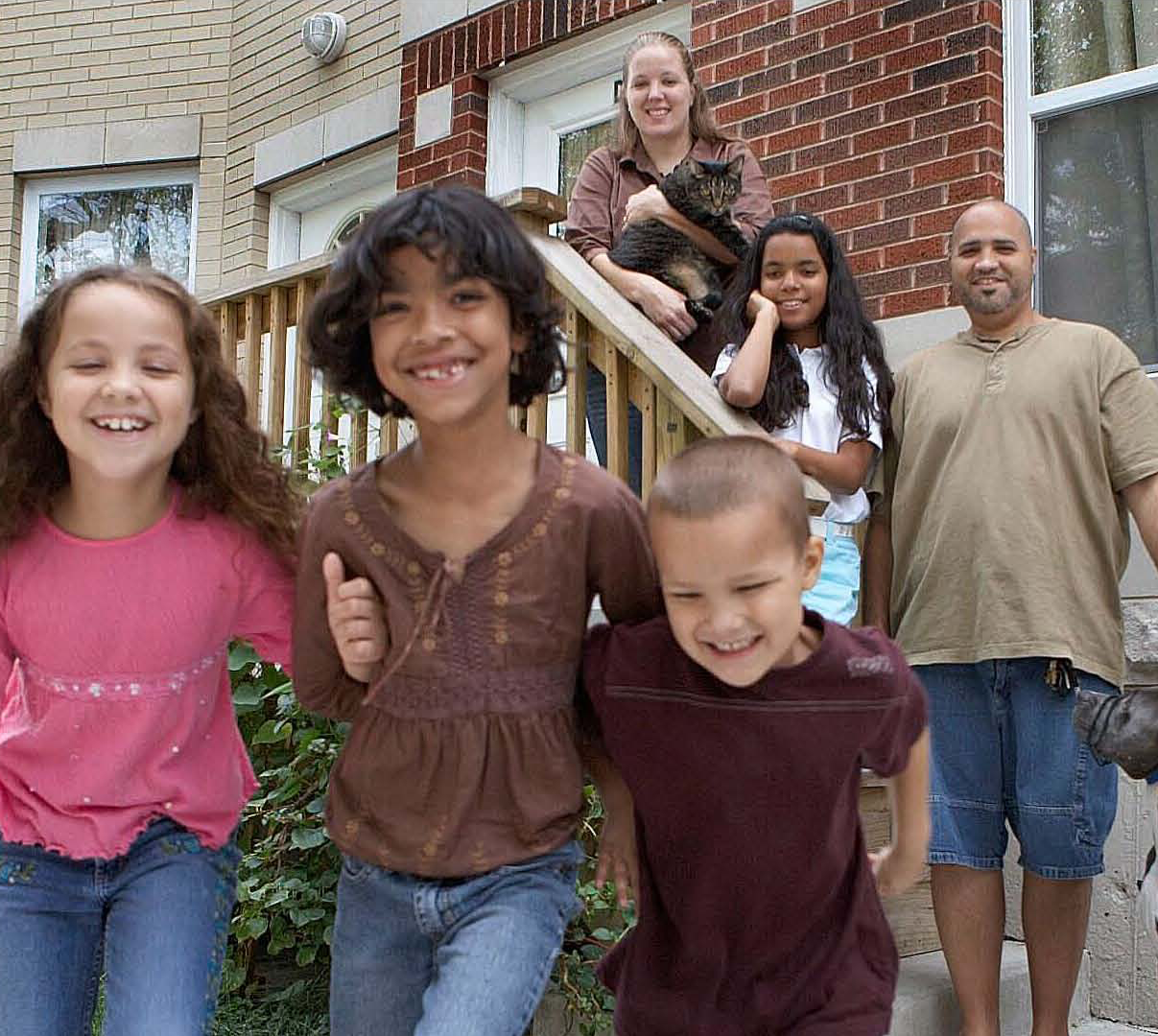Good morning, I am Jonathan Fanton, President of the MacArthur Foundation. I am pleased to share what the MacArthur Foundation is doing in Chicago to help address the nation’s foreclosure crisis as it is affecting our hometown.
As you can see from the list of participants, we have a terrific group assembled here to respond to your questions, including representatives from MacArthur, the City of Chicago, local lenders, and experts from the field. As a special historic note, the Woodstock Institute’s prescient reports have been chronicling the effect of mortgage foreclosures and other predatory practices since the late 1990s and Neighborhood Housing Services, along with the City of Chicago, has been operating the nation’s premier foreclosure counseling program, the Homeownership Preservation Initiative, since 2002.
After my introductory remarks, we all will be available to respond to your questions.
Foreclosures, linked to sub-prime mortgages and irresponsible lending practices, are at the heart of America’s current financial crisis. In Chicago, foreclosure filings increased 85 percent from 2005 to 2007. The situation is likely to get worse. As adjustable mortgage rates reset, many families will not be able to meet the higher payments. Filings are disproportionately located in neighborhoods where African Americans and Latinos live.
As families lose their homes, neighborhoods suffer. Renters in foreclosed properties have been evicted without legally required notice, losing security deposits, incurring moving expenses and often doubling up. Vacant houses quickly deteriorate, dragging down property values and encouraging crime and vandalism.
And the cost to local government is considerable: up to $34,000 per house in police and fire protection, trash removal, unpaid water bills, court proceedings, and, in some cases, demolition. Cost to neighbors and the housing market are equally serious: on average, almost a 1.5 percent drop in property value for every home within a eighth of a mile radius. We think there is a better way.
The MacArthur Foundation has invested in Chicago neighborhoods for almost 30 years – more than $720 million in total. Since 2002, we have committed $150 million to community and economic development in Chicago’s poor but promising neighborhoods, principally through the New Communities Program, a comprehensive community revitalization effort focused on 16 low-income neighborhoods. We have worked to help these communities become more secure, self-reliant, and successful, with early encouraging results.
At the end of 2006, looking at data provided by the Metropolitan Chicago Information Center (MCIC) and a composite measure called the Community Vitality Index, half the New Communities Program neighborhoods had improved while the city as a whole had declined; home prices were up in all neighborhoods, most in the 15 to 18 percent range. Business growth was up between 2.5 and 3 percent in all New Communities neighborhoods, against a citywide decrease of half a percent per year. But now, a wave of foreclosures threatens that progress in Englewood, North Lawndale, Chicago Lawn, Woodlawn, South Chicago, Grand Boulevard, and more – some of the city’s poorest neighborhoods and some of the hardest hit by foreclosures. We want to help get them get back on track.
Early last year we began to assess the likely effects of a major housing market correction, by year-end, staff began to design a program to help combat the foreclosure fallout in Chicago. We started to make grants in March in the Foreclosure Prevention and Mitigation Project that we are formally announcing today.
Many of the pieces of the Project are in place and underway. To summarize:
This year and next, we are committing at least $68 million dollars in grants and program-related investments to help local organizations accomplish three goals:
- keep more homeowners in their homes;
- assist renters forced to move as a result of foreclosure; and
- help the City of Chicago put vacant, foreclosed houses back into productive use as quickly as possible.
The Project is aimed primarily at the hardest hit neighborhoods but acknowledges that not everyone can be helped to remain a homeowner.
By 2010, our goals are to:
- reach 10,000 households,
- provide counseling to 6,000 homeowners in this group,
- prevent at least 2,700 foreclosures, and
- leverage more than $500 million dollars in financing for loans for homeowners and to help the City and its partners acquire foreclosed properties in order to stop the blight they cause in neighborhoods.
To achieve these goals, we will work on several fronts at once. Let me explain:
1) Education and assistance for property owners:
Homeowners in trouble with their loans suffer far less financial harm when they communicate with lenders. But almost half ignore or actively avoid them. We have given grants to LISC, Greater Southwest Development Corporation, and Neighborhood Housing Services, Legal Assistance Foundation and Spanish Coalition for Housing. This will help them reach out to more homeowners, work out solutions where possible, and to provide legal services, where appropriate, to those exposed to fraudulent mortgage practices. Bruce Gottschall and Dan Lindsey can say more about this in a few minutes.
2) Assistance for displaced renters:
A grant to the Lawyers Committee for Better Housing will help address the issue of delinquent landlords, the buildings they abandon, and the renters who end up in eviction court through no fault of their own. Kathleen Clark can answer your questions about this complicated part of the crisis.
While not part of this foreclosure project, we also are working to make sure that there is an adequate supply of affordable rental housing in Chicago. We created The Preservation Compact, which aims to help preserve 75,000 units of rental housing by 2020, which would reverse the trend of loss of units.
3) Access to financing:
We will provide up to $60 million in program-related investments – low-cost loans, bank deposits, or guarantees – for two key purposes: (i) to offer innovative mortgage products that will keep families in their homes, help those who have already lost their homes to buy new ones, and others to rebuild their credit so they can buy again down the road; and, (ii) to help the City of Chicago, in partnership with Mercy Housing, a national housing owner, developer and manager with a strong local presence, acquire, repair and dispose of vacant properties.
(i) Mortgages
We already have approved a $15-million deposit with ShoreBank to support their Rescue Loan and Prevention Program. This $100 million program is directed at 10,000 existing homeowners whose adjustable mortgages will reset to a higher rate within the next three years. Shorebank aims to help 1,200 of them refinance into a mortgage that they can afford over the longer term. Michelle Collins can provide more details.
A $9-million loan to Neighborhood Housing Services-Chicago will help create the Homeownership Retention and Neighborhood Preservation Loan Pool. Park National Bank and MB Financial are leading the current effort to raise $150 million for mortgages for 1,000 homeowners. Some will be able to keep their homes with a more affordable mortgage and others, who cannot get a conventional mortgage, will be able to buy homes in hard-hit communities. Bruce Gottschall can discuss this program.
Finally, later this month, we expect to finalize another program-related investment to Self-Help, a national community development financial institution based in North Carolina. Self Help has designed an innovative lease-purchase mortgage product with which local nonprofits (like Mercy and NHS) can purchase and rent vacant properties to households displaced by foreclosure. Families can rebuild their credit and within five years become eligible to become homeowners again.
We are excited about this array of mortgage innovations because, together, they should help make more loans available to households affected by or facing foreclosure. Traditional lenders are requiring increasingly higher credit scores– over 700 at present. All three of these programs expect to make sound mortgage loans to households with credit scores below this level by using thorough underwriting and, where appropriate, referral to quality homeowner counseling. Debra Schwartz can respond to your questions about these products.
ii) Recycling vacant properties
Finally, we will support Mercy Housing to work with the City of Chicago and numerous developers and community partners to create the capacity to acquire for resale, rental, rent-to-own, and redevelopment as many as 3,500 vacant and foreclosed properties in Chicago’s hardest hit communities.
The goal of our project is to sustain and expand current efforts to help homeowners, renters and communities, while national efforts like the recent bailout bill and the legal settlement with Bank of America/Countrywide take shape.
We hope our efforts will make a significant dent in the city’s total foreclosures, and have a positive effect on the neighborhoods where so many people have worked so hard. Through their efforts, communities have improved and opportunities have opened for talented residents who are determined to realize their individual potential and achieve a better life for their families. We do not want to let them down.





